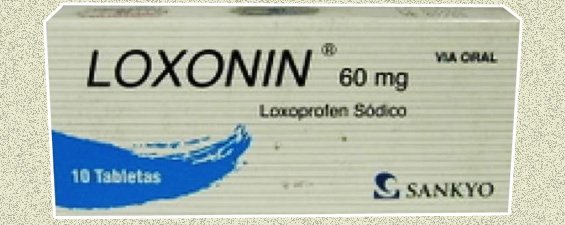Loxonin Tablets (Sodium loxoprofen), synthesized and developed by Daiichi Sankyo Co, Limited Japan is a new non-steroidal analgesic and anti-inflammatory drug in the phenylpropionic acid group. Loxonin is rapidly absorbed from the gastrointestinal tract and shows excellent analgesic and anti-inflammatory effects, while this drug is characterized by its relatively lower toxicity to the gastrointestinal tract than other non-steroidal analgesic and anti-inflammatory drugs because it is a prodrug showing effects after conversion to active compounds in the body.
When to use Loxonin Tablets?
Loxonin (loxoprofen) has anti-inflammatory and analgesic effects on the following diseases and symptoms;
- Chronic articular rheumatism
- Osteoarthritis
- Lumbago
- periarthritis of the shoulder and shoulder-arm neck syndrome
Loxonin also relieves pain and inflammation after operation, trauma and tooth extraction.
Recommended Dosage of Loxonin Tablets
- For general use, 1 tablet of Loxonin is orally administered to adults three times a day.
- For a single administration, 60-120 mg (1 to 2 tablets) are orally given.
- The dosage of Loxonin should be adjusted according to age and symptoms.
Pharmacology of Loxonin
Loxonin has excellent analgesic and anti-inflammatory effects. Its analgesic effect is specifically powerful. Loxonin has pharmacological characteristics such as a relatively lower toxicity to the gastrointestinal tract than other nonsteroidal analgesic and anti-inflammatory drugs because it is the prodrug showing the effect after absorption from the gastrointestinal tract and conversion to active metabolites. The mode of action of Loxonin is prostaglandin biosynthesis inhibition and its site of action is cyclooxygenase.
After oral administration, Loxoprofen is rapidly absorbed from the digestive tract in the unchanged form, causing weak irritation to the stomach mucosa and then rapidly converted to an active metabolite, the traps-alcohol form (in SRS configuration) which potently inhibits prostaglandin biosynthesis.
Urinary excretion of Loxonin is rapid and most amount of the drug administered is excreted in the unchanged form or in the glucuronic acid conjugated traps-OH form. About 50% of the dose is excreted in the urine within 8 hours after administration.
Loxonin Side Effects
- Hypersensitivity symptoms e.g. rash, itching and urticarial may occur. In such cases the administration of Loxonin should be discontinued.
- Peptic ulcer may also occur when using Loxonin Tablets. The common symptoms include abdominal pain, digestive discomfort, anorexia, nausea and vomiting, diarrhea, constipation, heartburn and dyspepsia. In such cases, the administration should immediately be stopped and precautionary measures should be taken.
- Drowsiness may infrequently occur and symptoms such as headache may rarely occur.
- Hematologic Eosinophilia may infrequently occur.
- Elevation of GOT, GPT and alkaline phosphatase may infrequently occur.
- Elevation of BUN may infrequently occur.
- Edema and palpitation may also occur when using Loxonin Tablets.
Use During Pregnancy and Lactation
The safety profile of Loxonin during pregnancy has not been established therefore the drug should be administered to patients who are or may become pregnant only if the expected therapeutic benefit, is thought to outweigh any possible risk.
Loxoprofen has been found to delay parturition and to be excreted in the milk in the animal experiments. Therefore, this drug should not be used during the late gestational period or the nursing period.
Loxoprofen has been reported to induce the constriction of the ductus arteriosus in rat fetuses when administered to rats in the late period of pregnancy.
When to avoid Loxonin Tablets?
This drug is contraindicated for;
- Patients with peptic ulcers.
- Patients with severe hematological disorders.
- Patients with severe hepatic disorders.
- Patients with severe renal disorders.
- Patients with hypersensitivity to this drug.
- Patients with aspirin asthma or a history thereof.

This information has being usefull to us, Thanks